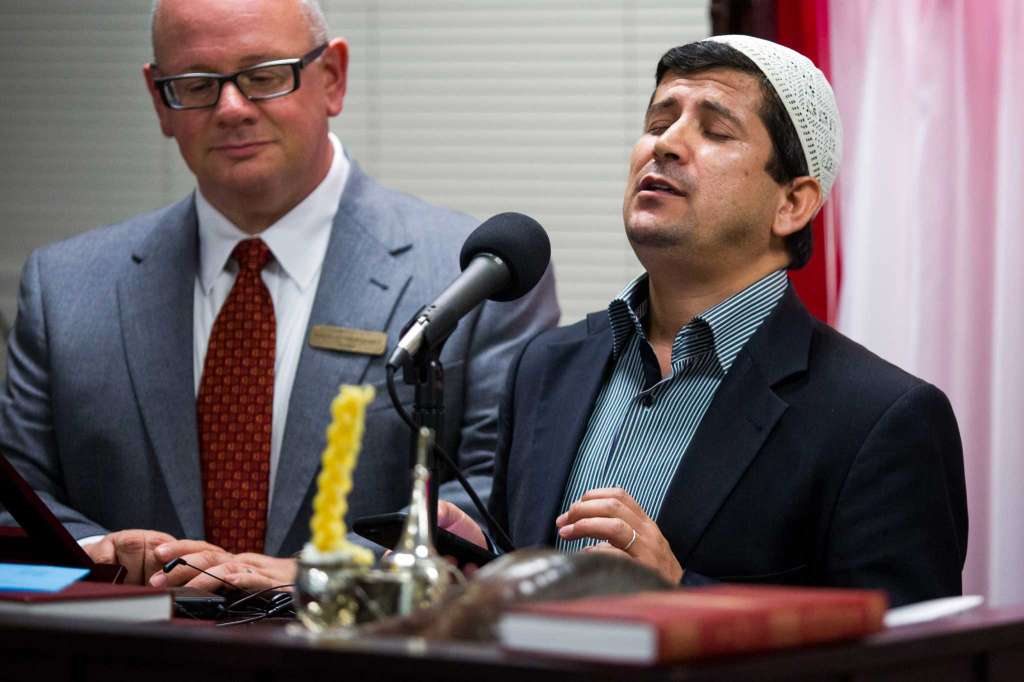Muslims, Jews break fast after Yom Kippur

Date posted: October 14, 2016
Elaine Ayala
Even before Mustafa Safak arrived at Temple Chai on Wednesday for closing Yom Kippur services, the San Antonio Muslim read up on the traditions associated with the Jewish holiday.
The holiest of High Holy Days for Jews, when they atone to those they’ve hurt, ends with the breaking of a daylong fast, Safak learned, a mournfulness culminating in festivity.
He made note of a traditional dish served at such feasts and scanned the buffet for his goal — noodle kugel, a small portion of which he served onto his plate as members of the two faith groups gathered to break bread.
Simple exchanges were on the menu for Temple Chai’s Yom Kippur “break fast,” to which Muslims from the Dialogue Institute of San Antonio and the Raindrop Turkish House were invited.
Both Turkish-American educational centers, inspired by Muslim scholar Fethullah Gülen, promote understanding between people of diverse faiths.
It may be uncommon for Jews and Muslims in other places of the world to gather on a special day in Judaism, but the local faith communities have been practicing what they preach for about two years, leaders said.
Members of Temple Chai, a Reformed Judaism congregation, attended events this summer marking Ramadan, Islam’s holy month, celebrated June 5 to July 5 this year.
“Now they’re reciprocating,” Safak said.
Iman Beytullah Colak, who’s originally from Argentina and knew Pope Francis when he was a cardinal, said interchanges such as what occurred Wednesday are part of the Gülen movement.
During Ramadan, he said, the Raindrop Turkish House hosted 26 local community groups. The two Muslim groups are active in San Antonio’s interfaith community, attending events such as the annual Martin Luther King Jr. March.
“It’s natural for us,” he said of Gülen identity. “Dialogue is the first step.”
“You force yourself to learn,” Colak added. “We learn from each other. They have fasting. We have fasting. They do charity. We do charity.”
Marion Rogers was impressed. For the resident of Ontario, British Columbia, half the year and Nayarit, Mexico, the other half, San Antonio was the logical stop to make for Yom Kippur.
“I think it’s fabulous,” she said of the bridge-building efforts. “ We’re descendants of Isaac and descendants of Ishmael, so we should be together.”
Rabbi David Komerofsky said networking “breaks down barriers and people’s assumptions of one another. They don’t rely on hearsay and see that we have much more in common.”
Several participants said such exchanges are important, given ongoing Mideast tensions and anti-Muslim hostility in Europe, where so many Syrian refugees have ended up.
Bridge-building is also important at home, where instances of anti-Semitism and Islamophobia have plagued communities, as have anti-Muslim proposals put forth by Republican presidential candidate Donald Trump.
After Sunday’s presidential debate, Muslims responded to Trump’s call for Muslims to report potential terrorism with a Twitter campaign — #MuslimsReportStuff — that mocked him.
Safak, outreach coordinator for the Raindrop Turkish House, noted Muslims have responded.
“We’re part of this community, and we live in this community and we owe a lot to this country,” he said. “We do our best.”
But Safak said labels such as “radical Islamic terrorist” have been harmful and have alienated Muslims.
“Muslims are fearful of saying they’re Muslim,” he said.
“We are teachers,” Safak said of the Raindrop Turkish House, which offers music, cooking and Turkish-language classes. “How could people accuse us of being terrorists?”
“Anti-Semitism and Islamophobia should be a thing of the past,” he said. “Islamophobia is wrong. Anti-Semitism is wrong.”
“On a global scale, things like this are important,” Safak said of the Muslim presence at Yom Kippur. “It’s a small drop in the ocean, but the ripple effects are important.”
Source: San Antoni Express News , October 12, 2016
Tags: Dialogue | Jewish Muslim Dialogue | North America | USA |
























